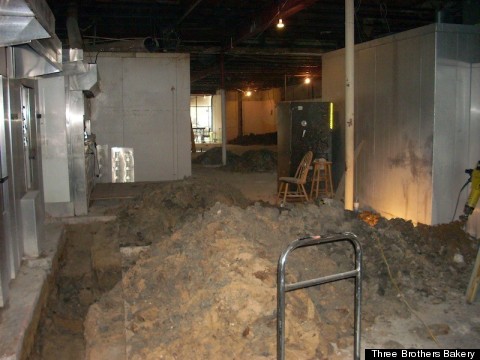In 2007 we were given notice our business insurance was not being renewed. We had always bought direct, but this time we went to a friend and agent, GEM Insurance.
Less than a year later Hurricane Ike hit the Galveston/Houston area on September 12th, 2008, and if we had been with the direct carrier, we would be out of business today.
After Hurricane Ike came ashore, our building lost its roof over the production area and had many leaks throughout the rest of it plus an outside wall had to be replaced. I called my new agent from GEM on September 13th; she was at home and able to tell me exactly my coverage, even as she dealt with her own structural problems. From the moment of the first call, we learned more than we wanted to know about insurance; but we did so with our agent by our side for over two years. Our claim turned out to be the largest claim in our agent's office.

Rebuilding after Hurricane Ike
Thankfully our agent wrote a policy covering both what we asked for, as well as what we actually needed. Our agent's foresight enabled Three Brothers Bakery to reopen on June 22, 2009, nine long months after the storm hit.
The bakery is now in growth mode illustrated as we ready to open a third store and revamp our website. Additionally, last year I graduated from the Goldman Sachs' 10,000 Small Businesses Program plus the bakery has received numerous honors including our family being honored by the Small Business Administration as the 2013 Jeffrey Butland Family-Owned Business of the Year for the Houston District. None of these wonderful things could have happened with inadequate insurance coverage.
(To see a video about our Ike experience, click here)
Lessons learned about insurance after Hurricane Ike:
1. Use a reputable insurance agent - do not buy direct.
Let them do what they do best, making sure you have appropriate and enough coverage for your business.
2. Tell your agent to cover you for the following:
If there was a fire and the business had to be closed for one year to rebuild, can you quote coverage to pay for this scenario, replenish income and pay our employees?
Then look for these items within your policy for major disasters:
•Lost business income for the entire period closed.
After the disaster, we agreed on a percentage amount to pay us. So don't just take what they give you after a claim - NEGOTIATE.
•Employee payroll and benefits for the entire period closed.
You want to continue to pay your key employees, as you will need them when you reopen. Be sure you, the owner, has a salary or you will not be covered. Draws usually are not covered.
•Full replacement cost of all contents lost - NOT depreciated cost.
•Full replacement cost of the entire building including attachments - be sure to reevaluate this item annually.
For the bakery the attachments included ovens and coolers/freezers.
•Full payment of extra expenses.
Items such as dumpsters, containers, mobile offices, etc.
•All continuing expenses (i.e., utilities and anything you pay monthly and contractual commitments)
These are negotiated on an item-by-item basis.
•Ramp up income for as long as possible.
The carrier will make you whole for a preset amount of time until you reach pre-disaster income.
•Outdoor sign coverage
Buy enough coverage to either replace or remove the sign, whichever is greater.
•Code compliance coverage (ordinance of law) with an enhancement of more than the standard base (usually about $10,000). READ CAREFULLY - VERY IMPORTANT
We had $150,000 worth of insurance in this category alone, and it did not cover it in its entirety. This coverage total included business income, which we did not understand until we were negotiating the payment.
•Electronic Data Insurance
•Food spoilage (if appropriate)
•Business income for power outage
This coverage is for transmission line outages.
•Damage to premises rented to you and the contents in it.
•Remote locations - property, content and business interruption
It should have the same coverage as a main location.
•Flood insurance to the maximum levels available, especially if you live in flood prone areas.
•Earthquake coverage, if appropriate
•Other types of insurance which may or may not be needed during a disaster:
Asbestos (whatever you can purchase)
Mold (whatever you can purchase)
Business Liability
Electronic Commerce
Money and Securities
Valuable papers and records
Sewer or drain backup
Employee dishonesty (a friend had her most trusted employee embezzle $2 million)
Employment practices
Identity recovery
Flexible Limit Endorsement
Burglary/Theft
Fine Arts
Terrorism (yes, you can get this type of coverage now)
Mechanical breakdown
Accounts receivable
Workers' Compensation
Umbrella policies
Business Auto
3. Ask your agent to always update you on available insurance and let you make the educated decision as to whether you need it or not, i.e., the power outage insurance.
4. Do not skimp on insurance. Buy the lowest deductible you can afford.
If you have a big disaster you will want your spare cash for the items not covered.
5. Have a good accountant preferably with experience with insurance claims.
You and your accountant will end up closer to each other than you ever imagined.
6. Do you need an independent adjuster in a disaster?
Only you can answer this question. It takes a team to rebuild, and part of the team includes your adjusters and your agent. If you have a good agent and are a good negotiator, you probably will not need one.
7. Read your policy!
If you have not read your insurance policy and spoken to your agent in the past year about your coverage, do so NOW! Hurricane season keeps getting longer and longer, and when you are out of that season, it is tornado season, wildfire season or floods occurring any season. It is always something.
This blogger graduated from Goldman Sachs' 10,000 Small Businesses program. Goldman Sachs is a partner of the What Is Working: Small Businesses section.